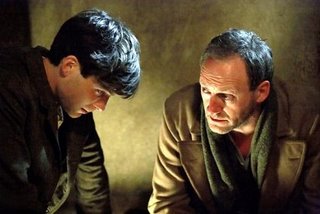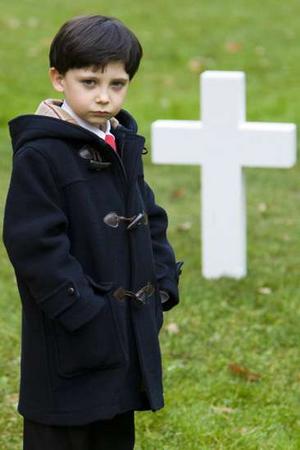
There has been so much written about Ken Loaches Palme d’Or winning Wind That Shakes The Barley it is almost impossible to separate the film itself from the entity that has taken shape in the media here and in Britain over the past couple of weeks. Yes, it is a masterfully drawn story of patriotism and rebellion, absolutely righteous in its commitment to exposing the barbaric colonial oppression of the British and precise in defining the timeline that lead to the treaty of 1921 and the start of the Civil War and the formation of the Free State. It is not however, a paean to the IRA as we knew them until recently, or a call to arms for modern-day republicans. Here, it is important to distinguish the on-the-runs and the flying columns of the 1920s from the paramilitary army of gangsters that terrorised this country for the past 30 years. Although republicans might flock to see this film, they will not find any comfort here. Loach is fundamentally not interested in what this struggle became, but rather how it came to be.
Taking its emotive title from an old patriot song, Loach and his regular screenwriter Paul Laverty have fashioned a heartbreaking story of sacrifice that tells the story of Ireland’s awful history in microcosm, taking the formation of a flying column of young republican rebels as a springboard for a discussion about colonial oppression, barbaric reprisal and the vacuum created when those who have taken power abandon the people to Civil War, the echoes of which still rattle through the hillsides of Cork and Kerry. A guerrilla war being a local war; the entire film takes place within a few square miles of the unnamed Cork village, with Loach opening his film in 1920 during a spirited hurling match. Afterwards, the players, including student doctor Damien (Cillian Murphy) and his brother Ted (Pádraic Delaney) are detained and assaulted by a squad of snarling Black and Tans, who accuse the hurlers of playing “paddy” games and speaking Irish, both illegal under British rule. One of the lads refuses to give his name in English and is beaten to death for his insolence. This act of casual barbarism is the trigger that politicises Damien, who abandons his plans to practise medicine in London to join his older brother and their firebrand friend Dan (Liam Cunningham) in forming a local IRA flying column and start the fight for independence. Operating in small, hastily-trained groups, they steal the weapons they need from an RIC barracks and, in a typically terse but hugely effective scene in a local bar, start their campaign against the Black & Tans.
Murphy, an ordinary guy who happens to be a brilliant actor, is excellent as the divided young patriot at the heart of the story, absolutely authentic and perfectly credible as a young man who sacrifices everything he has got rather than have it destroyed in front of him. It is his best film yet, perhaps because he is allowed to be himself, or who he would have been if he was born 100 years ago. Opposite him, Pádraic Delaney give a more careful performance, far more shrewd and pragmatic, while Liam Cunningham occasionally suffers under the weight of his impassioned speeches. In a less pivotal but important role, Orla Fitzgerald delivers a heartbreaking representation of suffering and sacrifice that is absolutely draining. Throughout the film, the emotions Loach asks his cast to call up are so emphatic, the dialogue so inflamed, that any weakness or incompatibility would be immediately obvious. Technically the film does wonders with a restricted budget, particularly the luminously earthy photography of Barry Ackroyd and the naturalistic costume design of Eimer Ni Mhaoldomhnaigh.
Stories of their brutal deeds have been told for almost 100 years so you don’t have to be a military historian to know that the Black and Tans were little better than uniformed death-squads. That is exactly how Loach portrays them; supremely aggressive and intimidating, quick to use violence and torture and ruthless in their recriminations. It is a representation that has caused considerable controversy in Britain, currently fighting a doubly patriotic war on the streets of Iraq and the football fields of Germany. Loach depicts terrible violence on both sides, brutal and poetic, but there can be no doubt about where the moral right lies. His film has a strict point of view, and within that he places a couple of distinct lectures about the political history of Ireland in the early part of the last century, framing that struggle against a simply-drawn individually human story of loss and division. Towards the end, the information tends to overshadow the emotion as the personal stories get lost in the political but that is not to deny the fervour and ferocity of either. This is powerful cinema. The prevailing political ideas of the time are presented, with time devoted to discussing the minute details that make al the difference and the difficulties involved in setting up an administration on a local level, but within this wider ideological battlefield, the people Loach and Laverty have selected to tell the story are occasionally pushed to the background, or given more space than required to make heavy-handed Marxist speeches, espousing an ideology that is as dead as disco. What is lost, in these spittle-flecked, over-oratorical discussions, is the film’s initial feeling of optimism and hope and fraternity; devastatingly exposed as a fraud later, when the ground has shifted and the brothers must take opposing sides. It is important to remember that these individuals are fictional, but the events the film portrays are as close to the truth as cinema can be.
In the end, and whether you agree with him or not, Loach’s thinking boils down to the simple fact that a people held captive by a colonial power must use military force to achieve freedom. It will not be handed to you and few escape once the ultimate choice has been made. Blood is spilled on everyone’s hands. The violence makes the film occasionally difficult to watch, but that is as it should be. A squadron of roaring Black and Tans beat a young man to death in a farmyard. They assault a railway guard for refusing them passage on a train. Later, in the films most disturbing scene, they burn out a house they suspect has harboured the rebel fighters and brutally assault the women inside, including Sinead (Orla Fitzgerald), Damien’s gentle, politically passionate girlfriend. Later, a grenade tossed into a truck full of Tans during an ambush explodes causing devastation, but it is an event that is restrained by reality which makes it all the more powerful. Loach’s camera remains dispassionately static; his soldiers die where they drop. These scenes have an unflinching savagery and an immediacy that makes them hugely effective – in depicting the atrocities that engendered a Nationalist consciousness in the people at the time, but also in firmly grounding the film’s grand political ideas with red blood on green grass.
These men and women are ordinary people, not politicians or kings, driven to extremes by centuries of oppression and state-sponsored murder. But this is not a republican film in a uniquely Irish sense, with a capital R and wrapped in a green flag, it is a film about all oppressed people driven to fight for freedom. The film can be successfully read as a straight historical drama, hugely atmospheric and perfectly played, but Loach is a deeper filmmaker than that. In The Wind That Shakes The Barley, the British filmmaker draws a straight line through time and space that connects Bandon and Baghdad, watching history repeating itself in cycles and damning the administrations that have not learned from their mistakes. There is also, for Irish viewers, a more sobering realisation. We can witness the high price that was paid for the freedom we enjoy today, and might reflect on how cheaply we then sold that dream on – to priests, corrupt politicians and property developers.
 Manhattan socialite and PR Ashley (Lindsay Lohan) is blessed with supernatural good fortune. Every scratch-card is a winner, it stops raining when she leaves her penthouse and she can always get a taxi. Everything is going great until one night she goes to a masquerade ball and meets Jake (Chris Pine), a penniless janitor at a bowling alley who moonlights as a manager, and is desperate to get a CD from his up-and-coming band into the hands of a music mogul. Ashley winds up kissing Jake, leading to her good luck being swapped with his bad, along with the spit. Immediately, she breaks a heel on her swanky stilletoes then she almost gets killed and winds up in jail. Worst of all, she loses her job and the platinum company credit card, although it is a mystery what exactly that job entailed beyond batting her eyelashes. Even to the world of eyelash-batting, this is no great loss. Nevertheless, Ashley must restore her mojo so sets about finding and kissing every dancer employed at the ball - like Cinderella with a chapstick. She must also stay alive, so takes Jakes old job in the bowling alley, cleaning toilets and deodorising shoes.
Manhattan socialite and PR Ashley (Lindsay Lohan) is blessed with supernatural good fortune. Every scratch-card is a winner, it stops raining when she leaves her penthouse and she can always get a taxi. Everything is going great until one night she goes to a masquerade ball and meets Jake (Chris Pine), a penniless janitor at a bowling alley who moonlights as a manager, and is desperate to get a CD from his up-and-coming band into the hands of a music mogul. Ashley winds up kissing Jake, leading to her good luck being swapped with his bad, along with the spit. Immediately, she breaks a heel on her swanky stilletoes then she almost gets killed and winds up in jail. Worst of all, she loses her job and the platinum company credit card, although it is a mystery what exactly that job entailed beyond batting her eyelashes. Even to the world of eyelash-batting, this is no great loss. Nevertheless, Ashley must restore her mojo so sets about finding and kissing every dancer employed at the ball - like Cinderella with a chapstick. She must also stay alive, so takes Jakes old job in the bowling alley, cleaning toilets and deodorising shoes.











